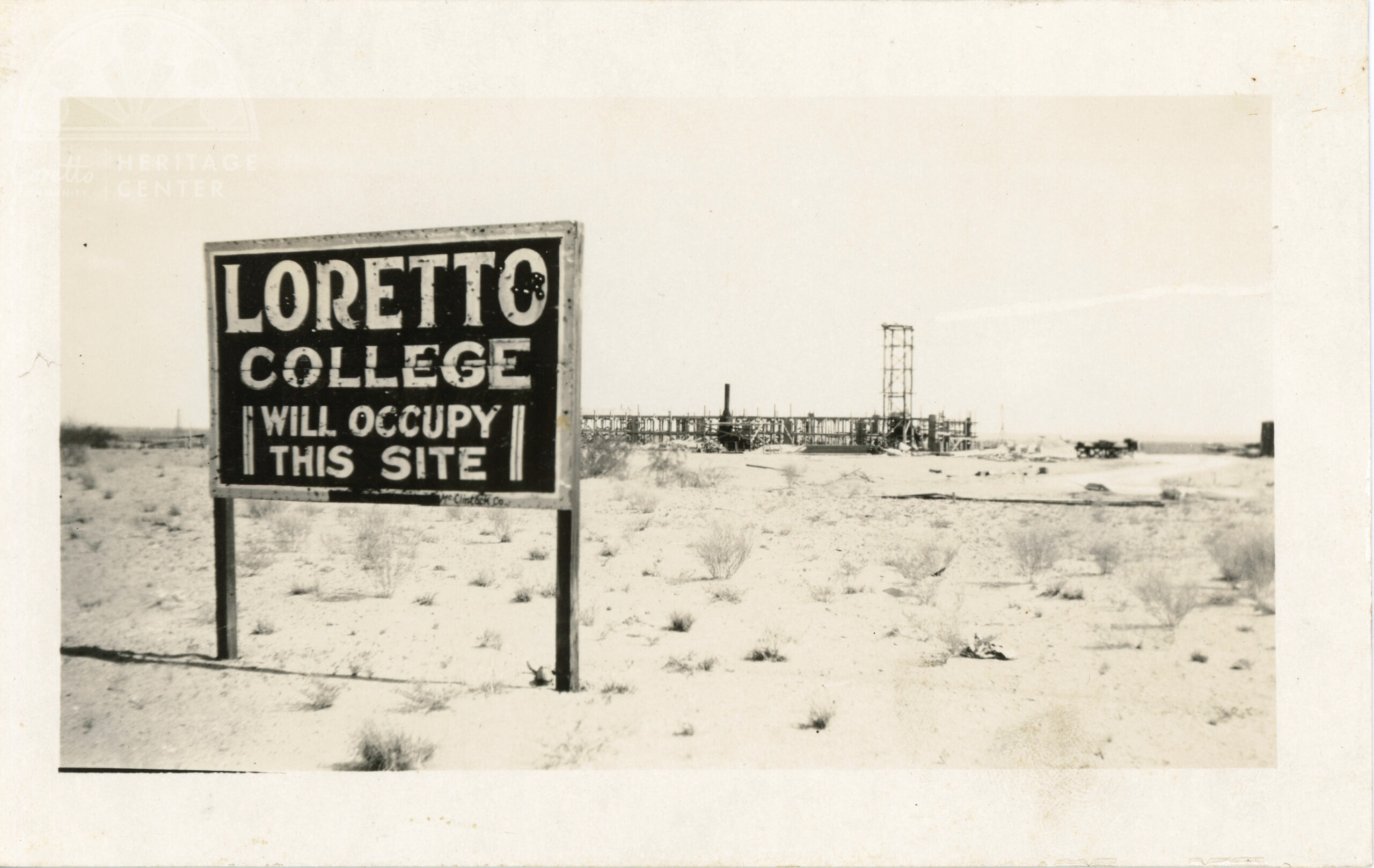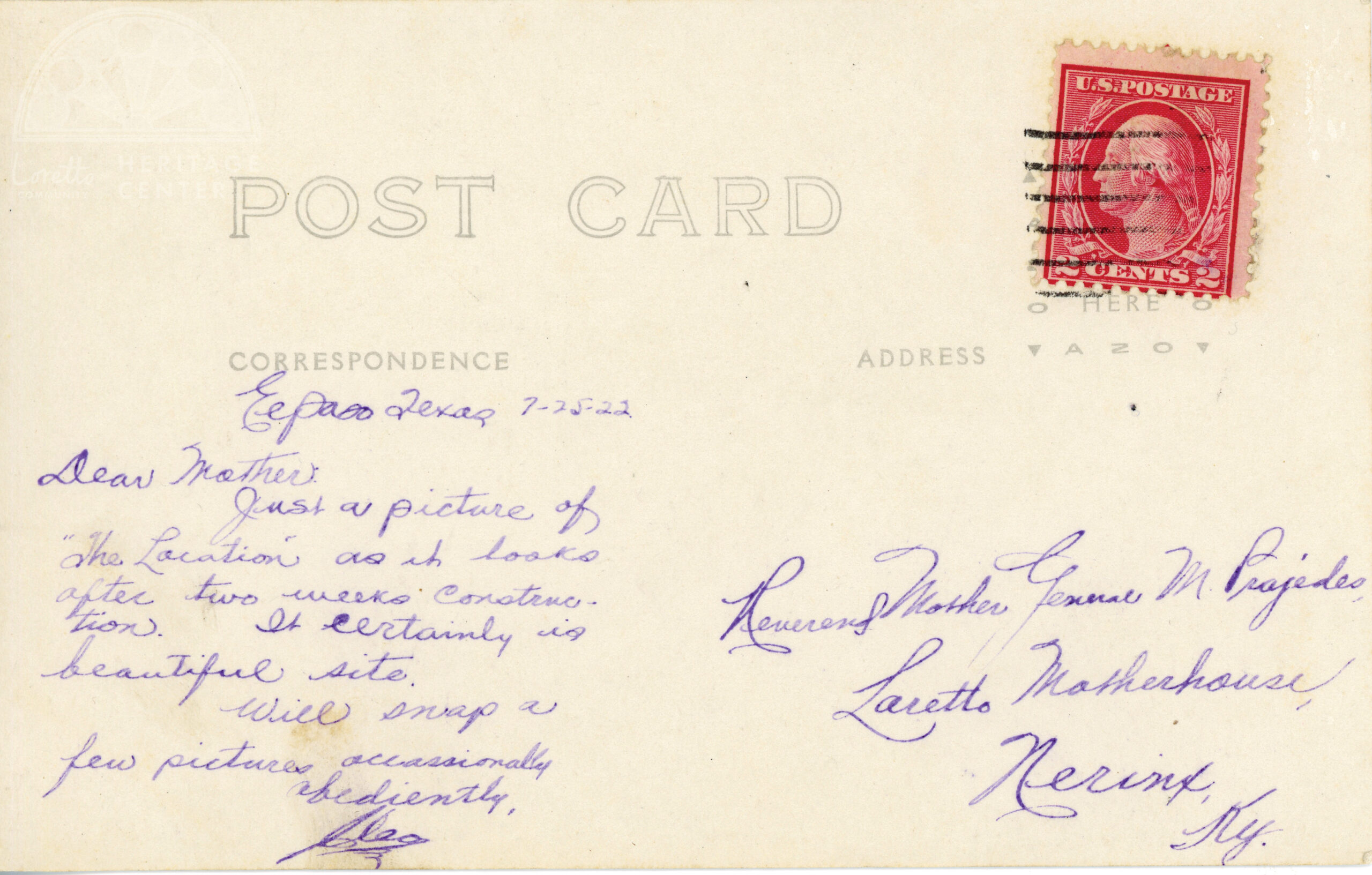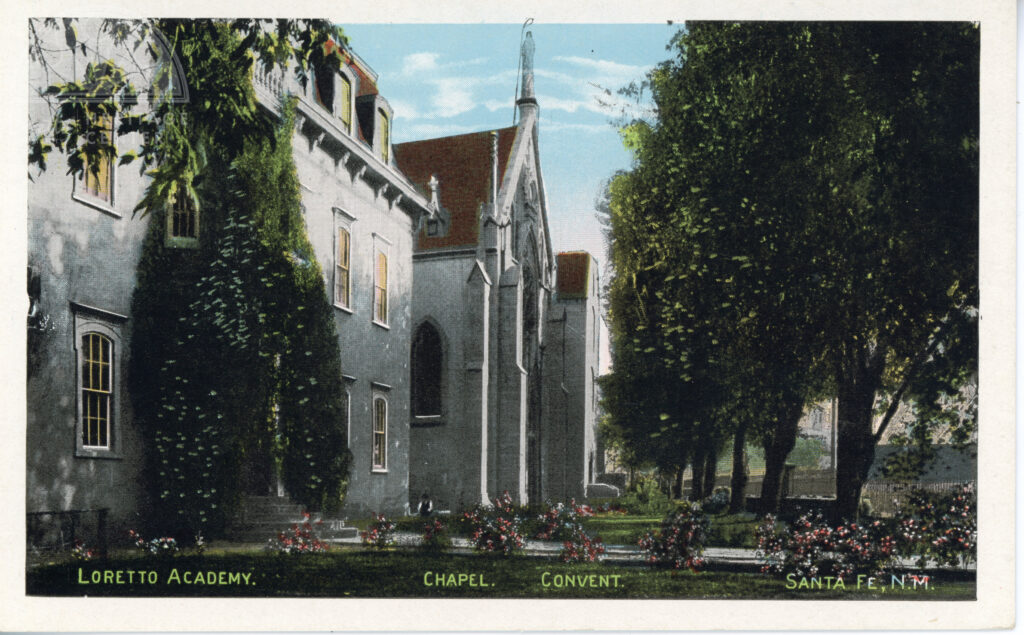An Archivist Perspective
Wish You Were Here: Loretto History in Postcards
By Angela Avera Selter, Archival Assistant, Loretto Heritage Center
Most everyone has received postcards from friends having fun while traveling to beautiful and interesting places, and hopefully we’ve had the opportunity to send a few, as well. Postcards are an immediate, brief form of correspondence and a quick and simple way to send cheerful thoughts to loved ones to let them know you’re thinking of them when you’re far away.
I have always enjoyed receiving a handwritten postcard. Some of them are so lovely that I’ve kept them for years, stuffed inside my photo albums; others are handmade by the sender as tiny original artworks, and several have found their way into frames to decorate the walls of my home and are a sweet reminder of the sender.
When I started my job as archival assistant at the Heritage Center, I was charmed by the number of vintage postcards that I found on the database and pleasantly surprised to see that most of them are of Loretto. The postcards I was familiar with were of famous places or vacation destinations and I never realized that colleges and universities had the same. Loretto’s postcards are from all across the country and document part of the history of place and people, so I thought I’d share a few of them here. When I mentioned my blog idea to coworkers, our archivist, Reba, popped in with books from her personal collection for me to read and a link to her college research on the subject. It’s a good read with links for further exploration. You can read it here: https://stjohnslis.libguides.com/c.php?g=925910&p=6673221
This sent me on a postcard history journey and I have learned that the decade between the years of 1905-1915 is known as the Golden Age of Postcards, which I had no idea ever existed, and there’s a name for the postcard collector: deltiologist. I won’t go into a lengthy history of postcards here–there’s plenty of information readily available online if you’re interested.
Instead, I will share a few of my favorite postcards with you from the Archives and a few thoughts about the history they document.

One realization I had while working with Loretto’s postcard collection is that the images are valuable to us as a snapshot in time to add to our history. They provide tangible documentation of architecture, fashion, events, geography, and much more–similar to what photographs provide but with one additional feature: the writer’s voice. Not all of our postcards have messages and, in many cases, there is no date evident on the media. The post office’s cancellation stamp can fill in that information but it’s not always the last word… For instance, if a person had the card for years before they mailed it, the scene depicted on the card’s front may have already changed because the original image date and post date are different. As with most prompts in historical documentation, clues must be double-checked. In addition, the design and style of the card’s front and back, as well as the postage stamp can assist in dating a postcard.
Postcards weren’t merely pretty pictures–many times, they were images of catastrophic events which were relevant to the sender, such as this view of Borromeo Catholic Church in St. Charles, MO after the cyclone of July 7th, 1915.

Or the flood in Pawhuska, Oklahoma in 1915.
Loretto Sisters taught at the St. Louis school there 1915-1942.

The site of the future Loretto College in El Paso, Texas was newsworthy as well. In this instance, we wouldn’t have a date or location but we can thank Cleo for providing those details in her message to Mother Praxedes. Her note reads: “El Paso, Texas, 7-25-22. Dear Mother, Just a picture of “the Location” as it looks after two weeks construction. It certainly is a beautiful site. Will swap a few pictures occasionally. Obediently, Cleo.”


Double-width postcards were great for showing off a panoramic view!


This is one of my very favorite postcards of Loretto Motherhouse, dated 1912.
The campus has changed a lot since then and it’s nice to have this view from the past, preserved.

Just for fun and because it’s summertime, I’ll round out this selection with a couple of
classic postcards of swimming pools!
The back side of the card has no personal message but the printed description tells us this:
“Swimming pool, Loretto Academy, El Paso, Texas. Resident and day school for girls conducted by the Sisters of Loretto. Kindergarten through High School.”

Informational text from the back of the postcard: “Loretto Heights College, Denver, Colorado Swimming Pool. The heated swimming pool and Colorado’s daily sunshine make swimming possible almost year-round in a program that provides for directed activities and recreational swimming. The physical education activities support Loretto’s liberal arts program. Tables around the Olympic-size pool invite socializing and casual study.”

Postcards have persisted through the centuries and certainly haven’t disappeared– they have merely changed in importance. Postcards can be found now almost as easily as during their Golden Age and more recently, they’re regaining popularity. They’re being utilized as a medium for artistic expression, for creative literary forms, and as a fun, throwback form of communication. In their heyday, they were the “new social media” and caused quite a stir. It’s good to know that they’re still around, circulating through our lives, spreading news, good cheer, and history. Next time you’re online, visit our database: https://lorettocommunity.canto.com/v/Archives/landing, type in “postcard” as a search term, and discover more of these gems in the Archives’ collection!

